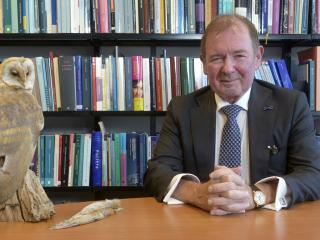Wonder as the true basis for research: Royal award for Victor Pop
Looking back on his career, Victor Pop spoke in his farewell speech on October 29, 2021 about his fascination with the wonders of pregnancy immunology, the nonsense that still circulates about postpartum depression and a groundbreaking study… of baby teeth. For his research, his track record in healthcare and years of commitment to improving primary care, Victor Pop has been appointed Officer in the Order of Orange-Nassau. “For me, wonder is the sound basis for conducting scientific research. That provides answers, but at least as many new fascinating questions.”

He doesn’t believe in coincidence. Still, the academic career of Emeritus Professor of Primary Care and former family doctor Victor Pop kicked off on the near-identical cases of two young mothers who came to his surgery, one shortly after the other, in 1980. “She was so proud of her son. After three months he had grown so much that she could no longer carry him upstairs,” Victor Pop reminisces about the patient who effectively originated his academic career. “Eventually, her friends became worried: you have lost so much weight, have you no strength left? To cut a long story short: the young mother was found to have an overactive thyroid. Shortly afterwards, the problem manifested itself in another young mother that came to my surgery. That got me thinking: is there a connection? The seed for my research had been sown, with the immune system as its basis.”
The miraculous mystery of the immune system during pregnancy
“The immune system protects us, but it also sometimes turns against the body, for instance, rejecting a transplanted organ or in autoimmune disorders like rheumatoid arthritis and diabetes. This fact makes pregnancy an immunological mystery! How can it be that the immune system is ‘turned off’ to stop the body from rejecting the foetus – half of which after all is made up of ‘foreign’ DNA – yet at the same time continues to function to keep the pregnant woman from succumbing to the first infection she contracts? During pregnancy, an immune chain reaction takes place in the body, similar to a person in deep shock who is fighting for their life in intensive care. And all of this without the pregnant woman noticing.”
The functioning of the immune system during pregnancy is a fascinating mystery
Fewer antibodies
This miraculous trick of the immune system during pregnancy is good news for pregnant women suffering from autoimmune disorders: immune adaptation mitigates the symptoms of rheumatoid arthritis, diabetes, or eczema. “This is even measurable in the blood. The effect is so strong that I would go so far as to say we will soon be able to prove that pregnant women are less susceptible to Covid-19. Unfortunately, after childbirth, symptoms often flare up again. This is the core of my research on autoimmune thyroid disease.”
Thyroid malfunction
“Thyroid conditions are the most prevalent autoimmune diseases and affect women eight to ten times more often than they do men. About 10% of women have a latent thyroid immune response before pregnancy without showing any symptoms. Until after childbirth the immune system needs to return to its original settings. That’s when every year in over 11,000 young mothers – that’s 7% of the 170,000 childbirths – immune adaptation goes into overdrive. And as you would expect, this mainly happens to women whose immune systems were already making antibodies against their own thyroid before pregnancy. That’s when they collapse: within five years of childbirth in 80% of them the thyroid has completely stopped functioning.”
Every year, over 11,000 women are diagnosed with a postpartum thyroid condition
Baby teeth
“Quite apart from the impact they have on the mothers, thyroid complaints during pregnancy also appear to be related to a host of developmental problems in children. The snag is that reliable developmental research with children can only be done from the age of three or four. Up to that age children catch up on many developmental delays, but even so in those first three or four years a lot can happen that adversely affects children. So how can we be certain that thyroid complaints during pregnancy contribute to developmental disorders?”

Thyroid conditions correlate with developmental delays in children, but how can we show that?
“Thanks to a wonderful new technique, dental biomarkers research, adult Neanderthal tooth layers yielded solid proof of what their owners had eaten at various stages in their lives. And it is precisely this technique, applied by the same brilliant researcher from New York, that we now also will be using. How it works? At approximately 14 weeks, the foetus grows a jaw and in it the first buds of milk teeth appear. These teeth consist of dentin layers, and every week a new layer grows, like a tree grows a new ring every year. At birth, a demarcation layer is formed, separating the prenatal dentin layers from the postpartum ones. The baby teeth continue to bud, emerge at three to four months, and begin to be replaced by permanent teeth at seven to eight years. By collecting, slicing, and laser-reading baby teeth we can determine what influences a child has been exposed to in the womb. Such influences could be, for example, lead or chemical compounds like PFAS, but perhaps also an excess or deficit of stress or thyroid hormone.”
In the layers milk teeth are made of, we can see what influences children were exposed to before birth
Budding research
“I think it’s terrific that at my age – I’m 65 – I have the opportunity to explore this budding and riveting research area and to be able to use a trial population of dozens of children from an earlier birth cohort survey when blood samples were collected from these children’s mothers during pregnancy. It’s been years since they gave birth, and the children now are at the age when their milk teeth start to shed."

"It would be sensational if we were to prove the impact of thyroid hormone during pregnancy on the development of children. There’s enough material to write research publications for at least ten years. And that’s in addition to the Brabant Survey, the most recent birth cohort survey I and several colleagues conducted, which it will be my privilege to lead for another year. I can’t see boredom knocking on my door just yet.”
Other research by Victor Pop: postpartum depression myths
Another of Victor Pop’s research interests is, and has been for thirty years, postpartum depression. “Sadly, a whole heap of humbug continues to scourge the earth. In science, too. For example, there still is no consensus on what precisely the postpartum period is. That’s embarrassing. What is also patent nonsense is that postpartum depression is hormone related. As early as 1988, the American psychologist Lewinsohn described the main predictors of depression: being young and being a woman. Unsurprisingly, then, depression is quite common among young mothers. But incidence is as high as it is for women who do not give birth. And postpartum depression comes with the same symptoms as any other depression.”
Bad timing
So it’s not hormones that leave young mothers vulnerable to depression. It’s actually perfectly ordinary predictors like the home environment, partner support, and susceptibility to depression. What is unique to the situation after childbirth though, as well a cause for concern, is the timing. “It’s always bad. The community is unreceptive. Young mothers don’t talk about it; didn’t they want to have a child? And they do have a baby to look after. If a depression impedes bonding between a mother and her child, there may be problems ahead.”
Date of publication: 2 November 2021



